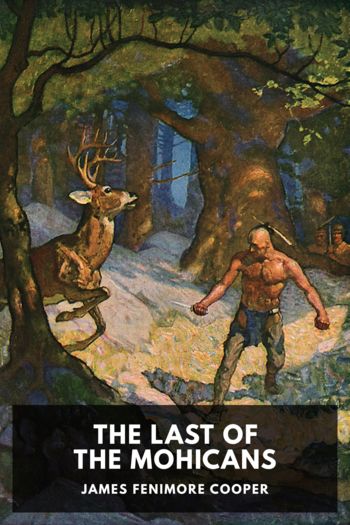The Last of the Mohicans, James Fenimore Cooper [best romance ebooks txt] 📗

- Author: James Fenimore Cooper
Book online «The Last of the Mohicans, James Fenimore Cooper [best romance ebooks txt] 📗». Author James Fenimore Cooper
The case was different with the individual whom Duncan had observed to stand forth with his friend, previously to the desperate trial of speed; and who, instead of joining in the chase, had remained, throughout its turbulent uproar, like a cringing statue, expressive of shame and disgrace. Though not a hand had been extended to greet him, nor yet an eye had condescended to watch his movements, he had also entered the lodge, as though impelled by a fate to whose decrees he submitted, seemingly, without a struggle. Heyward profited by the first opportunity to gaze in his face, secretly apprehensive he might find the features of another acquaintance; but they proved to be those of a stranger, and, what was still more inexplicable, of one who bore all the distinctive marks of a Huron warrior. Instead of mingling with his tribe, however, he sat apart, a solitary being in a multitude, his form shrinking into a crouching and abject attitude, as if anxious to fill as little space as possible. When each individual had taken his proper station, and silence reigned in the place, the gray-haired chief already introduced to the reader, spoke aloud, in the language of the Lenni Lenape.
“Delaware,” he said, “though one of a nation of women, you have proved yourself a man. I would give you food; but he who eats with a Huron should become his friend. Rest in peace till the morning sun, when our last words shall be spoken.”
“Seven nights, and as many summer days, have I fasted on the trail of the Hurons,” Uncas coldly replied; “the children of the Lenape know how to travel the path of the just without lingering to eat.”
“Two of my young men are in pursuit of your companion,” resumed the other, without appearing to regard the boast of his captive; “when they get back, then will our wise man say to you ‘live’ or ‘die.’ ”
“Has a Huron no ears?” scornfully exclaimed Uncas; “twice, since he has been your prisoner, has the Delaware heard a gun that he knows. Your young men will never come back!”
A short and sullen pause succeeded this bold assertion. Duncan, who understood the Mohican to allude to the fatal rifle of the scout, bent forward in earnest observation of the effect it might produce on the conquerors; but the chief was content with simply retorting:
“If the Lenape are so skillful, why is one of their bravest warriors here?”
“He followed in the steps of a flying coward, and fell into a snare. The cunning beaver may be caught.”
As Uncas thus replied, he pointed with his finger toward the solitary Huron, but without deigning to bestow any other notice on so unworthy an object. The words of the answer and the air of the speaker produced a strong sensation among his auditors. Every eye rolled sullenly toward the individual indicated by the simple gesture, and a low, threatening murmur passed through the crowd. The ominous sounds reached the outer door, and the women and children pressing into the throng, no gap had been left, between shoulder and shoulder, that was not now filled with the dark lineaments of some eager and curious human countenance.
In the meantime, the more aged chiefs, in the center, communed with each other in short and broken sentences. Not a word was uttered that did not convey the meaning of the speaker, in the simplest and most energetic form. Again, a long and deeply solemn pause took place. It was known, by all present, to be the brave precursor of a weighty and important judgment. They who composed the outer circle of faces were on tiptoe to gaze; and even the culprit for an instant forgot his shame in a deeper emotion, and exposed his abject features, in order to cast an anxious and troubled glance at the dark assemblage of chiefs. The silence was finally broken by the aged warrior so often named. He arose from the earth, and moving past the immovable form of Uncas, placed himself in a dignified attitude before the offender. At that moment, the withered squaw already mentioned moved into the circle, in a slow, sidling sort of a dance, holding the torch, and muttering the indistinct words of what might have been a species of incantation. Though her presence was altogether an intrusion, it was unheeded.
Approaching Uncas, she held the blazing brand in such a manner as to cast its red glare on his person, and to expose the slightest emotion of his countenance. The Mohican maintained his firm and haughty attitude; and his eyes, so far from deigning to meet her inquisitive look, dwelt steadily on the distance, as though it penetrated the obstacles which impeded the view and looked into futurity. Satisfied with her examination, she left him, with a slight expression of pleasure, and proceeded to practise the same trying experiment on her delinquent countryman.
The young Huron was in his war paint, and very little of a finely molded form was concealed by his attire. The light rendered every limb and joint discernible, and Duncan turned away in horror when he saw they were writhing in irrepressible agony. The woman was commencing a low and plaintive howl at the sad and shameful spectacle, when the chief put forth his hand and gently pushed her aside.
“Reed-that-bends,” he said, addressing the young culprit by name, and in his proper language, “though the Great Spirit has made you pleasant to the eyes, it would have been better that you had not been born. Your tongue is loud in the village, but in battle it is still. None of my young men strike the tomahawk deeper





Comments (0)